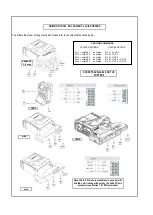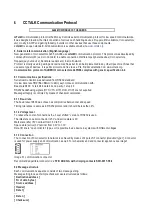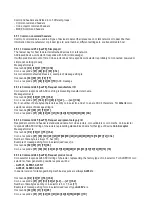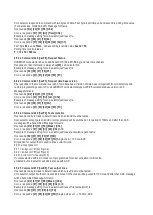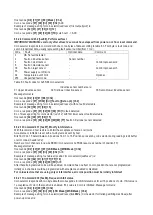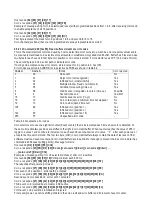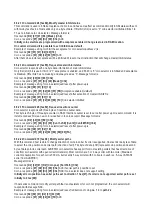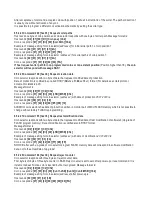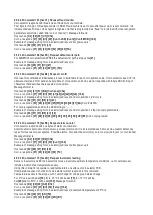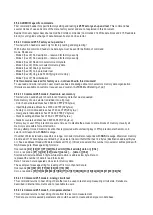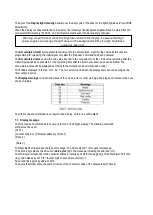
6.5.1.11
Command 3 [hex03], Clear comms status variables
After acceptance of command header 3, coin selector clears all three bytes of communication errors counters and
responds with ACK message. Message format is:
Host sends:
[Dir] [00] [01] [03] [Chk]
Coin s. responds:
[01] [00] [Dir] [00] [Chk]
ACK message
Example of message string for coin selector(
address 2
) is:
Host sends:
[02] [00] [01] [03] [FA]
Coin s. responds:
[01] [00] [02] [00] [FD]
ACK message
10 Details of description see in public document cctalk44-2.pdf
11 Address change, Address random
6.5.1.12
Command 2 [hex02], Request comms status variables
Coin selector responds with three byte data representing communication errors.
First byte is receive time out counter, second byte is number of ignored receive bytes (Number of receive buffer overflow
bytes), and third byte is number of checksum errors. Message format is:
Host sends:
[Dir] [00] [01] [02] [Chk]
Coin s. responds:
[01] [03] [Dir] [RxErr1] [RxErr2] [RxErr3] [Chk]
Example of message string for coin selector(
address 2
) with no errors is:
Host sends:
[02] [00] [01] [02] [FB]
Coin s. responds:
[01] [03] [02] [00] [00] [00] [00] [FA]
6.5.1.13
Command 1 [hex01], Reset device
After acceptance of Reset command, coin selector execute software reset and clear all variables in RAM or set them at
default value, including different counters and credit buffer. ACK message is sent before reset of coin selector. Host
software must set again:
-
inhibit state
-
sorter path
-
master inhibit (
if necessary
)
Message format is:
Host sends:
[Dir] [00] [01] [01] [Chk]
Coin s. responds:
[01] [00] [Dir] [00] [Chk]
ACK message
Example of message string for coin selector(
address 2
) is:
Host sends:
[02] [00] [01] [01] [FC]
Coin s. responds:
[01] [00] [02] [00] [FD]
ACK message
Host software must wait at least
100 ms
, to continue comunication with coin selector after reset instruction!
6.5.2
Coin acceptor specific command headers
Coin selectors use some specific commands, mostly for control of coin input, acceptance and direction (Sorter control
commands). Some commands are shared with other device like banknote reader or payout device.
6.5.2.1
Command 249 [hexF9], Request polling priority
Basic principle of detecting credit input or eventual errors from coin selector is sequential polling1 (Reading memory
buffer from coin selector). Coin selectors due to differences in mechanical and electrical construction has different
acceptance speed. All events are registered in memory buffer with limited size1 (Five stage double byte memory buffer).
To avoid credit loss, host must read coin selector credit buffer within limited time period.
Coin selector has internal mechanism to block the coin acceptance and registration of all events if polling time elapse.
For ALBERICI coin selector acceptance speed is from 3 to 4 coins per second ( Dependant on mechanical type of coin
selector - S type is faster than V type - and coin.
Considering that it is possible to register 5 event in the buffer, the adequate polling time will be about 1 sec. Because of
necessity to register even “close” and non accepted coins polling time must be even shorter.
For ALBERICI coin selectors AL55/66 using cctalk interface, poll time is set to 500 ms.
Coin selectors that use standard 10 pole interface are not necessary to poll. In that case polling time unit is set to 0(
no
polling
)! Minimum time for polling must not be shorter than overall message time. It is 38 ms for coin selector with
response time 2ms and byte gap 1 ms.
Summary of Contents for AL66 FG ARM
Page 1: ...AL66 FG ARM Pulse mod ccTalk COIN ACCEPTOR Operator s Manual Rev 2 01 User Manual...
Page 2: ......
Page 34: ......









